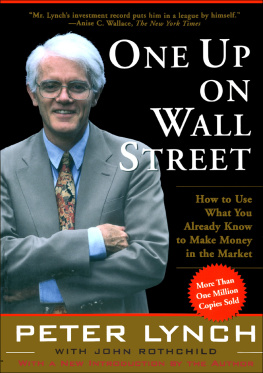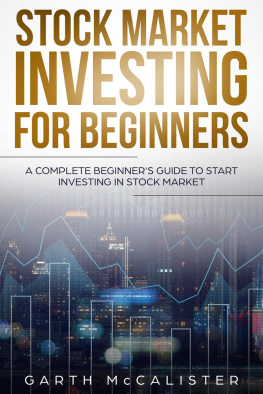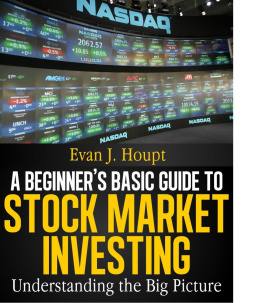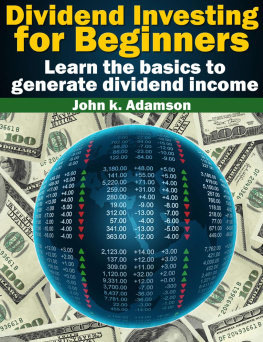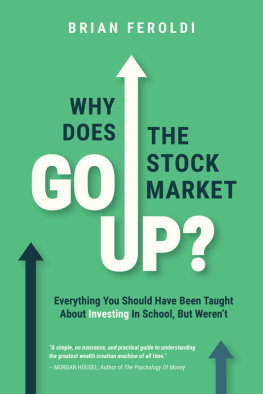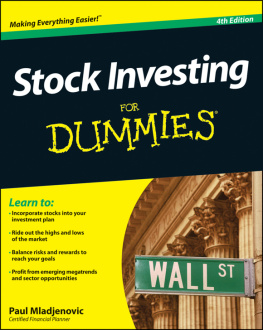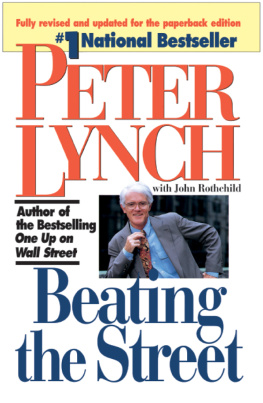Thank you for purchasing this Simon & Schuster eBook.
Join our mailing list and get updates on new releases, deals, bonus content and other great books from Simon & Schuster.
C LICK H ERE T O S IGN U P
or visit us online to sign up at
eBookNews.SimonandSchuster.com

C ontents
To the Lynch children
(Mary, Annie, Beth),
the Rothchild children
(Chauncey, Berns, Sascha),
and all beginning investors,
young and old.
A cknowledgments
The following people deserve special mention for the research and fact-checking help they provided on this book: Kathy Johnson, Charlene Niles, Deborah Pont, all courtesy of Worth magazine; Peggy Malaspina and her associates at Malaspina Communications: Lyn Hadden, Karen Perkuhn, Elizabeth Pendergast, and Susan Posner.
From Fidelity and its various resources: Robert Hill, Bart Grenier, Suzanne Connelly, Tim Burke, Evelyn Flynn, Shirley Guptill, Bob Beckwitt, Julian Lim, Debbie Clark, Jeffrey Todd, and Denise Russell. From the Securities Research Corporation: Donald Jones and his staff.
Wed also like to thank the staffs at the Wellesley Public Library and the Babson College Library; Joan Morrissey at St. Agnes School; David Berson at Fannie Mae; Nancy Smith, director of investor education at the Securities and Exchange Commission; our two agents, Doe Coover and Elizabeth Darhansoff; our editor, Bob Bender, and his assistant, Johanna Li.
P reface
The junior high schools and high schools of America have forgotten to teach one of the most important courses of all. Investing. This is a glaring omission. History we teach, but not the part about the great march of capitalism and the role that companies have played in changing (and mostly improving) the way we live. Math we teach, but not the part about how simple arithmetic can be used to tell the story of a company and help us figure out whether it will succeed or fail in what its trying to do and whether we might profit from owning shares of its stock.
Home economics we teach: how to sew, how to cook a turkey, even how to stick to a budget and balance a checkbook. Whats often left out is how saving money from an early age is the key to future prosperity, how investing that money in stocks is the best move a person can make, next to owning a house, and how the earlier you start saving and investing in stocks, the better youll do in the long run.
Patriotism we teach, but we talk more about armies and wars, politics and government, than we do about the millions of businesses, large and small, that are the key to our prosperity and our strength as a nation. Without investors to provide the money to start new companies that hire new workers, or to help older companies grow bigger, become more efficient, and pay higher wages, the world as we know it would collapse and thered be no jobs for anybody and the United States would be out of luck.
In the past five years, a tremendous thing has happened in what used to be called the communist bloc, the countries behind the Iron Curtain. The citizens of those countries have risen up and overthrown their governments and sent their communist leaders packing, in the hope that someday they can improve their lot in life. Democracy is among the things they want, as are freedom of speech and freedom of worship, but up there with the Bill of Rights freedoms, they also want free enterprise. That includes the right to make things, sell things, and buy things in stores, the right to own a house, an apartment, a car, or a business, which until recently, perhaps half the worlds population was not allowed to do.
The Russians and the Eastern Europeans marched, demonstrated, held strikes, organized, agitated, and fought as hard as they could to get the economic system that we have already. Many people went to jail for this cause, and many lost their lives. Yet in our own schools we dont teach the basics of how this economic system works, and whats good about it, and how you can take advantage of it by becoming an investor.
Investing is fun. Its interesting. Learning about it can be an enriching experience, in more ways than one. It can put you on the road to prosperity for the rest of your life, yet most people dont begin to get the hang of investing until they reach middle age, when their eyes start to go bad and their waistlines expand. Then they discover the advantages of owning stocks, and they wish theyd known about them earlier.
In our society, its been the men whove handled most of the finances, and the women whove stood by and watched men botch things up. Theres nothing about investing that a woman cant do as well as a man. Also, you dont get the knack for it through the chromosomes. So when you hear somebody say, Hes a natural-born investor, dont believe it. The natural-born investor is a myth.
The principles of finance are simple and easily grasped. Principle number one is that savings equals investment. Money that you keep in a piggy bank or a cookie jar doesnt count as an investment, but any time you put money in the bank, or buy a savings bond, or buy stock in a company, youre investing. Somebody else will take that money and use it to build new stores, new houses, or new factories, which creates jobs. More jobs means more paychecks for more workers. If those workers can manage to set aside some of their earnings to save and invest, the whole process begins all over again.
Its the same story for every family, every company, every country. Whether its Belgium or Botswana, China or Chile, Mozambique or Mexico, General Motors or General Electric, your family or mine, those who save and invest for the future will be more prosperous in the future than those who run out and spend all the money they get their hands on. Why is the United States such a rich country? At one point, we had one of the highest savings rates in the world.
A lot of people must have told you by now that its important to get a good education, so you can find a promising career that pays you a decent wage. But they may not have told you that in the long run, its not just how much money you make that will determine your future prosperity. Its how much of that money you put to work by saving it and investing it.
The best time to get started investing is when youre young, as well discuss in more detail later. The more time you have to let your investments grow, the bigger the fortune youll end up with. But this introduction to finance is not only for young people. Its for beginning investors of all ages who find stocks confusing and who havent yet had the chance to learn the basics.
People are living much longer than they used to, which means theyll be paying bills for a lot longer than they used to. If a couple makes it to sixty-five, theres a good chance theyll make it to eighty-five, and if they make it to eighty-five, theres a decent chance one of them will reach ninety-five. In order to cover their living expenses theyll need extra money, and the surest way to get it is by investing.
Its not too late to start investing at age sixty-five. Todays sixty-five-year-olds might be looking at twenty-five more years during which their money can continue to grow, to give them the wherewithal to pay the twenty-five years worth of extra bills.
When youre fifteen or twenty, its hard to imagine the day will come when youll turn sixty-five, but if you get in the habit of saving and investing, by then your money will have been working in your favor for fifty years. Fifty years of putting money away will produce astonishing results, even if you only put away a small amount at a time.
The more you invest the better off youll be, and the nation will be better off as well, because your money will help create new businesses and more jobs.
Next page

